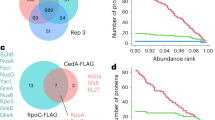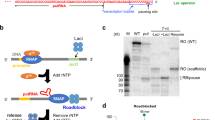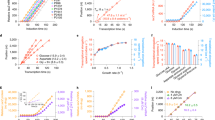Abstract
Bacterial promoters are the sites at the 5′ end of each gene that bind RNA polymerase and direct the initiation of transcription. The functional elements of Escherichia coli promoters1,2 are two highly conserved sequences, each about six nucleotides long, usually centred at sites −10 and −35, +1 being the initiating nucleotide. We have been interested in the structure of promoters of genes that are subject to stringent control, that is whose expression is reduced in conditions of amino acid shortage, such as rRNA and tRNA genes. We have therefore mapped the sequences involved in promoting in vivo transcription of a bacterial tRNATyr (tyrT) gene by fusing the tyrT promoter region to a galactokinase (galK) gene, and using in vivo expression of galactokinase activity to measure promoter strength. We show here that efficient expression from the tyrT promoter requires specific sequences upstream of the canonical promoter elements, and we suggest that these sequences constitute an extended promoter structure.
This is a preview of subscription content, access via your institution
Access options
Subscribe to this journal
Receive 51 print issues and online access
$199.00 per year
only $3.90 per issue
Buy this article
- Purchase on Springer Link
- Instant access to full article PDF
Prices may be subject to local taxes which are calculated during checkout
Similar content being viewed by others
References
Rosenberg, M. & Court, D. A. Rev. Genet. 13, 319–353 (1979).
Siebenlist, U., Simpson, R. B. & Gilbert, W. Cell 20, 269–281 (1980).
Duester, G., Elford, R. M. & Holmes, W. M. Cell 30, 855–864 (1982).
Wong, E. M., Meusing, M. A. & Polisky, B. Proc. natn. Acad. Sci. U.S.A. 79, 3570–3574 (1982).
Stueber, D. & Bujard, H. EMBO J. 1, 1399–1404 (1982).
Dunn, R., Belagaje, R., Brown, E. L. & Khorana, H. G. J. biol. Chem. 256, 6109–6118 (1981).
Altman, S. & Smith, J. D. Nature 233, 35–39 (1971).
Kupper, H., Contreras, R., Landy, A. & Khorana, H. G. Proc. natn. Acad. Sci. U.S.A. 72, 4754–4758 (1975).
McKenney, K. et al. in Gene Amplification and Analysis Vol. 2 (eds Chirikjian, J. G. & Papas, T.) (Eisevier, Amsterdam, 1981).
Maniatis, T., Fritsch, E. F. & Sambrook, J. Molecular Cloning, a Laboratory Manual (Cold Spring Harbor Laboratory, New York, 1982).
Sanger, F. & Coulson, A. R. FEBS Lett. 87, 107–110 (1978).
Rossi, J., Egan, J., Berman, M. & Landy, A. in RNA Polymerase, tRNA and Ribosomes: their Genetics and Evolution (eds Osawa, S., Ozeki, H., Uchida, H. & Yura, T.) 185–208 (Tokyo University Press, 1980).
Author information
Authors and Affiliations
Rights and permissions
About this article
Cite this article
Lamond, A., Travers, A. Requirement for an upstream element for optimal transcription of a bacterial tRNA gene. Nature 305, 248–250 (1983). https://doi.org/10.1038/305248a0
Received:
Accepted:
Issue Date:
DOI: https://doi.org/10.1038/305248a0
This article is cited by
-
RNA polymerase and an activator form discrete subcomplexes in a transcription initiation complex
The EMBO Journal (2006)
-
Translation of ‘rare’ Codons in a Cell-free Protein Synthesis System from Escherichia coli
Journal of Structural and Functional Genomics (2006)
-
DNA supercoiling — a global transcriptional regulator for enterobacterial growth?
Nature Reviews Microbiology (2005)
-
Effect of guanosine tetraphosphate (ppGpp) on the conformational state ofE. coli RNA polymerase and transcription directed by tyrT, T7D, and T7A1 promoters
Russian Chemical Bulletin (1995)
-
The regulation of ribosomal RNA synthesis and bacterial cell growth
Archives of Microbiology (1994)
Comments
By submitting a comment you agree to abide by our Terms and Community Guidelines. If you find something abusive or that does not comply with our terms or guidelines please flag it as inappropriate.



